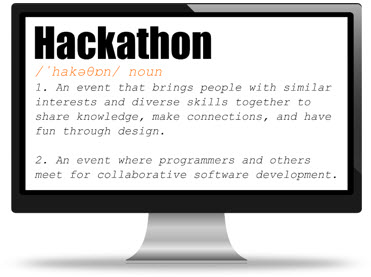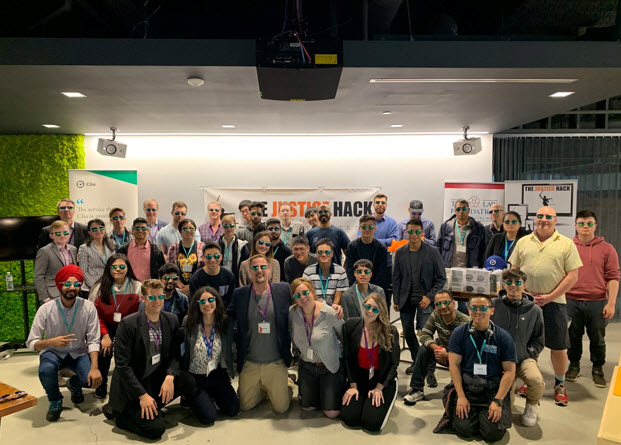The Justice Hack recently held its second annual Vancouver event – the largest access-to-justice hackathon in BC. It attracted more than 60 hackers, lawyers and access-to-justice (A2J) enthusiasts who spent a weekend tackling some of the barriers that impede small businesses’ access to justice and legal services.
If you missed the Vancouver hackathon it’s not too late – you can still take part in The Justice Hack Victoria on November 2-3, 2019!
What is the Justice Hack?
This kind of hacking doesn’t involve any unauthorized intrusion into a computer or network – it simply means using technical knowledge to overcome a problem.
Founded in 2018, The Justice Hack combines two typically distinct groups of professionals. It brings together technologists and legal professionals to share knowledge and brainstorm ideas for improving access to justice in BC. The event also combines two distinct concepts: hackathons and A2J.
The Justice Hack defines a hackathon as:

According to the Action Committee on Access to Justice in Civil and Family Matters, access to justice is at a critical stage in Canada, and change is urgently needed. In a 2013 report to the Canadian Forum for Civil Justice, the committee noted that:
• few will have the resources to solve them
• members of poor and vulnerable groups are particularly prone to legal problems, and experience more legal problems than higher income earners
• having one kind of legal problem can often lead to other legal, social and health related problems
• legal problems have social and economic costs, and unresolved legal problems adversely affect people’s lives and the public purse.
Canada’s formal justice system would be “overwhelmed” if it were expected to help resolve all of the everyday legal challenges experienced by the public. The ways of the past, according to the report above, are simply not sustainable.
Something needs to change. Justice should be speedier, more affordable and more accessible, as it “is critically important for the daily lives of people and for the social, political and economic well-being of society.”
“For the system to be strong and effective,” the report notes, “people must have meaningful access to it.”
The Justice Hack’s founder and co-organizer is Brandon D. Hastings, a lawyer. He says “The Justice Hack is designed to build capacity in justice innovation in British Columbia, and improve access to justice, one hack at a time. It does this by bringing together various people with diverse skillsets and similar interests, including technologists, business leaders, designers, academics, justice system actors, and legal professionals.
Over the course of The Justice Hack events, participants learn about challenges in justice and work in teams to tackle some of the most difficult issues at the intersection of justice and technology.”
The Justice Hack Vancouver
The Justice Hack’s inaugural hackathon had participants develop solutions to improve A2J in the area of Family Law. This year, teams were encouraged to present projects focused on addressing the everyday legal problems of small- and medium-sized enterprises and start-ups.
During the hackathon, participants enjoyed presentations from Civil Resolution Tribunal chair Shannon Salter and UBC Peter A. Allard School of Law assistant professor Camden Hutchison. Teams were formed thanks to the expert guidance of Amanda Semenoff. A number of mentors joined the teams throughout the weekend, as did numerous dedicated volunteers. The Honourable David Eby, Q.C., provided greetings.

The difficult task of judging the team presentations on Sunday fell to six judges: KPMG Law LLP partner Mark Meredith; Peter German & Associates principal Dr. Peter German, Q.C.; UBC Law assistant professor Camden Hutchison; Peck and Company partner Jeffrey Campbell; Salman Azam, assistant deputy minister and executive financial officer, Ministry of Public Safety and Solicitor General; and Ina Ergasheva, assistant director of the BCICAC's Canadian International Internet Dispute Resolution Centre
Seven teams pitched seven great ideas for improving A2J in our province. The 2019 Justice Hack – Vancouver champions developed Comply: a solution designed to help small- and medium-sized businesses keep compliant in an efficient and cost-effective manner.
This year’s winner of the Clio "Live a Learning Mindset" Award was Open Court: a project focused on the power to make court data (in particular data embedded in decisions) uniform, accessible and available to data scientists and other solution designers.
The KPMG Impact Award went to team Mediate BC. Their team proposed Resolution Pathfinder: a platform that better connects clients to professionals who offer mediation services.
Other thought-provoking ideas included:
• an easy-to-use platform that helps businesses incorporate affordably and maintain their records. (BizWiz also collects valuable data on the needs of businesses operating in B.C.)
• ways to improve the criminal justice system in India
• standardizing adjudicative decisions, to make them useable in data science
The Justice Hack was made possible in 2019 by the support of its presenting sponsor Clio, its venue sponsor KPMG, and The Law Foundation of British Columbia; as well as its promotional partners, Vancouver Startup Week and Vancouver Legal Hackers.

The Justice Hack – Victoria
This November, The Justice Hack is expanding beyond Vancouver for the first time. The Justice Hack – Victoria will run November 2-3, wrapping up Access to Justice Week in BC.
Tickets and updates are available on Twitter (@thejusticehack) under the hashtags #JustHack and #A2J. You can help The Justice Hack be successful in Victoria by taking part, by joining the conversation on Twitter, by sharing this article, and by telling friends and colleagues about The Justice Hack’s work.
Information and tickets to the Victoria event are now available on Eventbrite. You can sign up with a team, or join a team formed at the event.
It is an exciting time for The Justice Hack, and more broadly, justice innovation. As The Justice Hack expands, it is looking for feedback from justice system actors and users. If you have questions, ideas or feedback, please email 2019 co-chair Hayley Woodin at hayley@thejusticehack.org. For questions and information about the upcoming Victoria event, reach out to Alex Mitchell at alexandria@thejusticehack.org.

